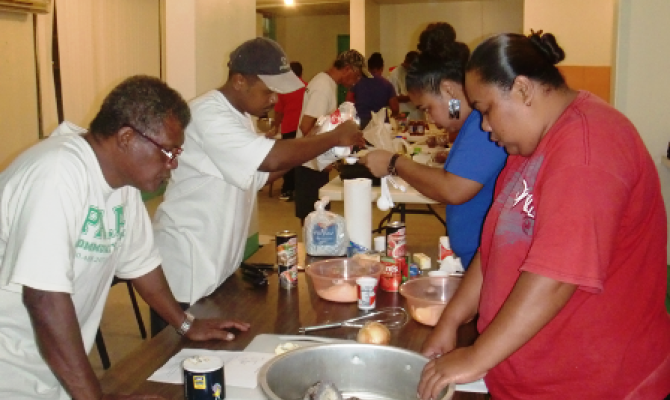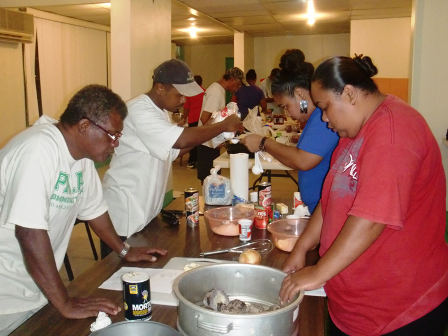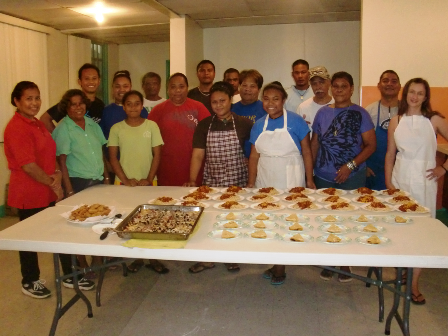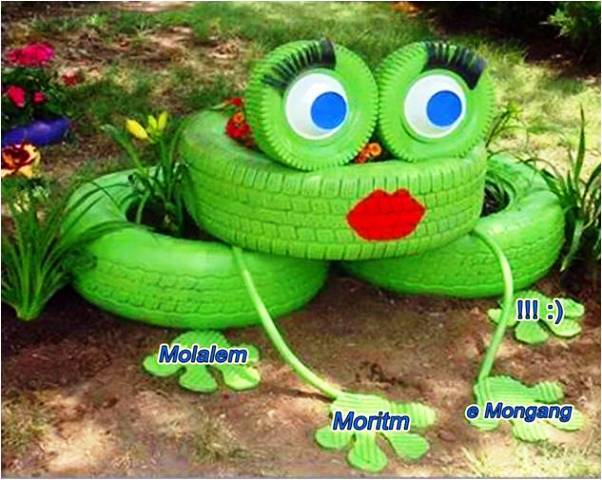
Climate Change Resilience
1 August 2014, Nadi Fiji - A new recipe book containing over 60 new recipes developed since 2010 using local produce will be launched in Palau before the end of this year as part of the Pacific to Adaptation to Climate Change (PACC) project in the island nation.
Food security and production has been the main focus of the PACC Palau project, after a study undertaken by the Bureau of Agriculture showed that 90% of food in Palau is processed and imported. After experiencing two typhoons within the space of one year has revealed the threat to food security should ships be unable to reach Palau.

"From the Farm to the Table" approach in Palau is working with local communities to enhance local food processing to add value, improve shelf life of produce, strengthen national marketability and promote the nutritional value of local food.
Since 2010 over 60 new recipes using local produce have been developed as a result of this initiative. Due to popular demand, these recipes will be shared through a new recipe book that will be published later this year.
"We have worked with different communities, youth groups and schools to help them bring produce from their gardens to the table. We use so many imported goods in our households so we have been trying to shift behaviour and encourage people to eat and substitute local produce in familiar and popular recipes," said Madelsar Ngiraingas, the National Coordinator of PACC in Palau.
"We have held training workshops where our participants have generated creative recipes like pizza and pasta using taro flour instead of regular flour and other foods that substitute imported products with local produce that still taste delicious but more nutritious."

In 2014 eight different training workshops were held throughout Palau, and triple that amount the year before that. A team of food technology specialists travel throughout Palau to conduct the trainings that is part of an existing initiative that was led by the Pacific Community College Cooperative Research Extension (PCCRE). This effort has been further strengthened through the Pacific Adaptation to Climate Change Project.
"Our food processing program is so popular that we are consistently being requested to conduct trainings in local communities, in some cases to hold repeat training workshops. From the Farm to the Table is a very popular initiative in Palau and we’re excited to publish our recipe book, which is already in demand!"
Palau PACC approaches food security with multi-sector, multi-agency and multi-state partnerships.
Most recently and perhaps most significantly, partners from the private (Palau Chamber of Commerce), education (Ministry of Education) and health sectors (Bureau of Public Health) have been instrumental in strengthening the food sector.
Aside from the obvious food sector partners, the private, education and health sectors are invested in ensuring local food quality and quantity for the tourism industry, youth and the general public, respectively.
The reputation of the Palau Community College-Cooperative Research Extension, the Palau PACC implementing agency has been able to build on these existing relations to garner support and attention from these sectors.
“We are confident that Palau PACC will have a more positive impact on a wider range of stakeholders with these partnerships,” states Ms.Ngiraingas.

The Pacific Adaptation to Climate Change (PACC) Project began in 2009 and ends in December this year. PACC covers 14 Pacific island countries, including Palau, helping to adapt to climate change by targeting one of the three key areas of food security and production, water resource management and coastal protection.
PACC is a multi-million dollar activity funded by the Global Environment Facility and the Government of Australia. The United Nations Development Programme (UNDP) is the implementing agency and the Secretariat of the Pacific Regional Environment Programme (SPREP) is the implementing partner, responsible for coordination and overall project management.
The Pacific Adaptation to Climate Change Project countries are Cook Islands, Fiji, Federated States of Micronesia, Marshall Islands, Nauru, Niue, Palau, Papua New Guinea, Samoa, Solomon Islands, Tonga, Tokelau, Vanuatu. The 5th Multipartite Review Meeting of the Pacific Adaptation to Climate Change Projects is held in Nadi, Fiji from 28 July to 1 August.
Photos courtesy of PACC Palau.
Food security and production has been the main focus of the PACC Palau project, after a study undertaken by the Bureau of Agriculture showed that 90% of food in Palau is processed and imported. After experiencing two typhoons within the space of one year has revealed the threat to food security should ships be unable to reach Palau.

"From the Farm to the Table" approach in Palau is working with local communities to enhance local food processing to add value, improve shelf life of produce, strengthen national marketability and promote the nutritional value of local food.
Since 2010 over 60 new recipes using local produce have been developed as a result of this initiative. Due to popular demand, these recipes will be shared through a new recipe book that will be published later this year.
"We have worked with different communities, youth groups and schools to help them bring produce from their gardens to the table. We use so many imported goods in our households so we have been trying to shift behaviour and encourage people to eat and substitute local produce in familiar and popular recipes," said Madelsar Ngiraingas, the National Coordinator of PACC in Palau.
"We have held training workshops where our participants have generated creative recipes like pizza and pasta using taro flour instead of regular flour and other foods that substitute imported products with local produce that still taste delicious but more nutritious."

In 2014 eight different training workshops were held throughout Palau, and triple that amount the year before that. A team of food technology specialists travel throughout Palau to conduct the trainings that is part of an existing initiative that was led by the Pacific Community College Cooperative Research Extension (PCCRE). This effort has been further strengthened through the Pacific Adaptation to Climate Change Project.
"Our food processing program is so popular that we are consistently being requested to conduct trainings in local communities, in some cases to hold repeat training workshops. From the Farm to the Table is a very popular initiative in Palau and we’re excited to publish our recipe book, which is already in demand!"
Palau PACC approaches food security with multi-sector, multi-agency and multi-state partnerships.
Most recently and perhaps most significantly, partners from the private (Palau Chamber of Commerce), education (Ministry of Education) and health sectors (Bureau of Public Health) have been instrumental in strengthening the food sector.
Aside from the obvious food sector partners, the private, education and health sectors are invested in ensuring local food quality and quantity for the tourism industry, youth and the general public, respectively.
The reputation of the Palau Community College-Cooperative Research Extension, the Palau PACC implementing agency has been able to build on these existing relations to garner support and attention from these sectors.
“We are confident that Palau PACC will have a more positive impact on a wider range of stakeholders with these partnerships,” states Ms.Ngiraingas.

School gardens hold a Farm to the table competition whereby students must grow their produce
and then use their produce to make a meal.
and then use their produce to make a meal.
The Pacific Adaptation to Climate Change (PACC) Project began in 2009 and ends in December this year. PACC covers 14 Pacific island countries, including Palau, helping to adapt to climate change by targeting one of the three key areas of food security and production, water resource management and coastal protection.
PACC is a multi-million dollar activity funded by the Global Environment Facility and the Government of Australia. The United Nations Development Programme (UNDP) is the implementing agency and the Secretariat of the Pacific Regional Environment Programme (SPREP) is the implementing partner, responsible for coordination and overall project management.
The Pacific Adaptation to Climate Change Project countries are Cook Islands, Fiji, Federated States of Micronesia, Marshall Islands, Nauru, Niue, Palau, Papua New Guinea, Samoa, Solomon Islands, Tonga, Tokelau, Vanuatu. The 5th Multipartite Review Meeting of the Pacific Adaptation to Climate Change Projects is held in Nadi, Fiji from 28 July to 1 August.
Photos courtesy of PACC Palau.